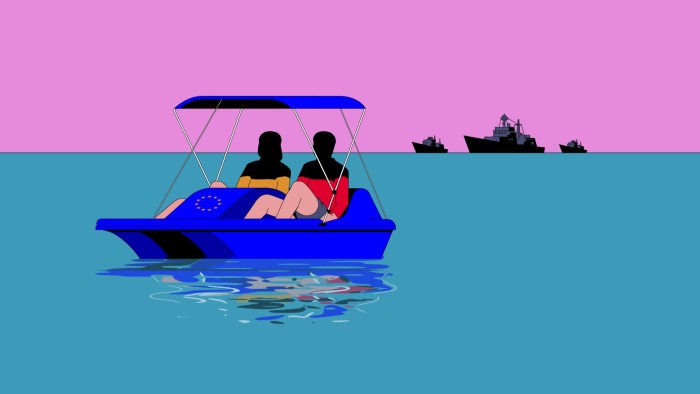Stay informed with free updates
Simply sign up to the Life & Arts myFT Digest — delivered directly to your inbox.
Imagine a people living their best lives on an island in about 1800. They have no enemies. They don’t need to work long hours. The gentle waters around them are full of fish. One day, giant ships appear carrying hostile outsiders. They have superior technology, including magical firing weapons! Picture the islanders’ panic.
Today’s Europeans are like those islanders. Suddenly, stronger unfriendly outside forces — notably, Russia, China and Donald Trump’s US — threaten from all sides. Bruno Maçães, Portugal’s former Europe minister, whose brilliant talk at the Aspen Institute’s recent Faith Angle conference prompted this column, said: “The loss of power by a formerly hegemonic west looks to many like colonisation in reverse.” (Incidentally, Maçães doesn’t think we’re being colonised.) Even the literal waters around us are rising.
Faced with new threats, Europeans feel paralysed. How should we respond?
The European experience for about 500 years was hegemony. Europeans first colonised Africa and the Americas, then India, before helping inflict China’s “century of humiliation”. For almost all this time, the only threats we faced were from other Europeans (counting Russia as European). And while Europeans emigrated to every other continent, until the 1950s hardly anyone had the temerity to immigrate to Europe. That seemed to us the natural order.
The US replaced Europe as hegemon after 1941, but it seemed it would be our friend for ever. European life without hegemony turned out to be even sweeter than before. Think back to 2000. Britain’s economy that year was about the size of India’s and China’s combined. Russia was an economic basket-case with a new pro-western president, Vladimir Putin, who flirted with joining Nato. Even Europe’s terrorists seemed to be fading into retirement.
Many Europeans in 2000 felt grateful to their wise leaders. Older people remembered the war, while in some countries every adult remembered the dictators. Europeans back then knew what they stood for: democracy and “anti-fascism”. When a far-right party entered Austria’s government in 2000, the EU issued sanctions against the country.
Bits of that paradise survive today. Europeans still live just about the longest, most leisurely existences in history. Admittedly, our chieftains’ gatherings in Brussels don’t solve many problems, but they have helped keep an unprecedented “long peace” between rival European clans.
But now we feel unequipped to handle the hostile outsiders with their magical technologies: car batteries and objects that draw energy from the sun! Even technologically inferior outsiders are scary because, unlike us, they seem willing to die in battle. The North Korean troops in Ukraine are probably the first Asian army fighting in Europe under its own political command since 1300, noted Maçães.
The outsiders see Europeans as backward peoples who stopped having children and who possess only a few cute ancient assets worth stripping: our châteaux, universities, handbags and football clubs. European powers used to carve up other countries. Now that fate threatens us, starting perhaps with Trump handing much of Ukraine to Russia in a “peace deal” on which Europeans are barely consulted. Many European states risk becoming clients of China’s “informal empire”, or possibly Russian colonies. Joshua Livestro, author of A More Perfect Union, about the 500-year history of European “federal union”, calls this “the plaything scenario”.
What to do? Maçães urges Europeans to update our self-image. We’re now a small player that must get along with bigger players who have different values. But try changing a centuries-old mindset.
Mario Draghi, ex-president of the ECB, in his strategic report for the EU, advocates more Europe: “unprecedented” new private, public and federal spending, including on defence. National governments don’t seem keen. “Historical turning points never come at convenient moments,” acknowledges Livestro. But he says Europe only ever leaps forward when a crisis erupts and there’s no other choice.
Europe’s mainstream political parties prefer to ignore the giant warships sailing towards us. Meanwhile, the far right concentrates on expressing Europeans’ inchoate anxiety about the outsiders. Think of the British right’s agitation against the “small boats” crossing the Channel. Far-right parties promise to ban the most visible outsiders, the immigrants, while placating Putin and Trump. “That’s the plaything recipe,” comments Livestro.
He says: “If you don’t fight, you end up like [colonised] India, you’ll get eaten bit by bit.” For now, it’s a plausible outcome.
Email Simon at [email protected]
Follow @FTMag to find out about our latest stories first and subscribe to our podcast Life and Art wherever you listen
Read the full article here




